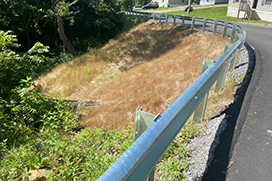ECS was awarded an Engineering Excellence Award by the American Council of Engineering Companies (ACEC) for their work at Forrest Hills Community in Swannanoa, NC. ECS designed reticulated micropiles and tie-backs to provide a permanent stabilization of an active landslide under challenging site and subsurface conditions. ECS was awarded for their work based on innovative application of existing techniques, future value to the engineering profession, social, economic and sustainable design, complexity and exceeding client needs.
Forrest Hills is a residential community providing affordable housing to over 75 families in Buncombe County. Dustin Drive serves as the primary access through the development, with a City of Asheville water supply main crossing below the road. In October 2018, failure of an MSE retaining wall initiated a landslide which closed the road and threatened the aging critical water main. ECS assisted the community and the repair contractor with an innovative geotechnical design consisting of reticulated micropiles and tie-backs that allowed for emergency services access to be maintained for residents while protecting the City’s critical infrastructure and worker safety.
According to a 2019 study, Buncombe County ranks 98th out of 100 counties across North Carolina in terms of affordable housing needs. Forrest Hills provides much needed affordable housing for over 75 families in this rural part of the County, and Dustin Drive serves as the only access roadway through the community. Closure of the road would have restricted emergency services to over 30 families who would have had to temporarily relocate as result. Furthermore, had the North Fork water supply main been damaged as a result of the continued slope movement, it could have disrupted the municipal water supply to many of Asheville’s 90,000 residents.
ECS worked with the community to not only keep the road open while a repair could be designed and constructed, but also found a cost-effect approach that could be implemented within their limited budget. The innovative use of micropiles to stabilize an active landslide saved the community an estimated $200,000 over more conventional re-grading approaches.

